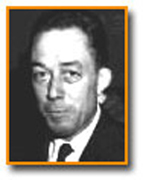Albert Camus (1913-1960)
Algeria and France
 Albert
Camus was born in Mondovi, Algeria, a colony of France. His family
lived in very poor conditions, especially after his father died
fighting in WWI. The poverty of his younger years greatly influenced
his philosophy and he developed a sense of sympathy for all people.
Despite his very poor conditions at home, Camus was a good student
and his teacher, Louis Germain, helped him get a scholarship to
go to a good high school, which helped him get into college. When
he became the second youngest person to win a Nobel Prize in 1957,
he dedicated it to his teacher, Germain. The poor living conditions
he had to deal with growing up led to his greatest physical challenge
- tuberculosis. He would battle it for the rest of his life. During
his adult life, Camus worked as a newspaper editor for various
newspapers. During WWII, he was living in Paris and working for
the French Residence when he became friends with Andre Gide, a
French novelist and Nobel Prize winner, and Jean Paul Sartre,
a French philosopher. Camus was a member of the Communist Party,
but became disenchanted by their lack of concern for people. He
died in a car accident in 1960. Ironically, he had said earlier
in his life that he could think of nothing more meaningless than
dying in a car accident.
Albert
Camus was born in Mondovi, Algeria, a colony of France. His family
lived in very poor conditions, especially after his father died
fighting in WWI. The poverty of his younger years greatly influenced
his philosophy and he developed a sense of sympathy for all people.
Despite his very poor conditions at home, Camus was a good student
and his teacher, Louis Germain, helped him get a scholarship to
go to a good high school, which helped him get into college. When
he became the second youngest person to win a Nobel Prize in 1957,
he dedicated it to his teacher, Germain. The poor living conditions
he had to deal with growing up led to his greatest physical challenge
- tuberculosis. He would battle it for the rest of his life. During
his adult life, Camus worked as a newspaper editor for various
newspapers. During WWII, he was living in Paris and working for
the French Residence when he became friends with Andre Gide, a
French novelist and Nobel Prize winner, and Jean Paul Sartre,
a French philosopher. Camus was a member of the Communist Party,
but became disenchanted by their lack of concern for people. He
died in a car accident in 1960. Ironically, he had said earlier
in his life that he could think of nothing more meaningless than
dying in a car accident.
While Camus worked for the French resistance, he wrote and edited
for the Resistance newspaper, Combat, where he formalized his
philosophy that all life is sacred and encouraged his readers
to live by strict moral principals. Camus believed that life was
absurd -- defying logical explanation and irrational, but Sartre
and other philosophers of his time, he still believed that in
spite of its absurdity, life was valuable and worth defending.
"When you have once seen the glow of happiness on the face
of a beloved person, you know that a man can have no vocation
but to awaken that light on the faces surrounding him. In the
depth of winter, I finally learned that within me there lay an
invincible summer." He believed that life is an adventure
without final meaning, but still worth experiencing. Since there
is nothing besides life, people need to live life to the fullest
and find meaning in human existence. "If, after all, men
cannot always make history have meaning, they can always act so
that their own lives have one." Although he was an atheist
and did not believe in sin, he stated, "If there is a sin
against life, it consist perhaps not so much in despairing of
life as hoping for another life and in eluding the implacable
grandeur of this life."
Perhaps the most famous quote attributed to Camus expresses his
value of human life, "Don't walk in front of me, I may not
follow. Don't walk behind me, I may not lead. Walk beside me and
just be my friend."
Some of Camus' books:
The Stranger
The Myth of Sisyphus
The Plague
The Rebel*
Reflections on the Guillotine*
*Camus received the Nobel Prize
for Literature in 1957 based on these works.
Discussion Questions
How would Camus have answered the question:
"Which is more powerful, love or hate?"
How might Camus' views on life have changed if he had grown up
in wealth instead of poverty?
What would Camus say to people who complain about their lives?
What would Camus say about the War in Iraq? Why? What would he
say about the war against Terror? How would his feelings differ?
Why?
To learn more about Albert Camus, follow these links:
http://www.quotationspage.com/quotes/Albert_Camus/
http://www.littlebluelight.com/lblphp/quotes.php?ikey=3
http://www.littlebluelight.com/lblphp/intro.php?ikey=3
http://www.tameri.com/csw/exist/camus.asp
http://www.imagi-nation.com/moonstruck/clsc40.html

